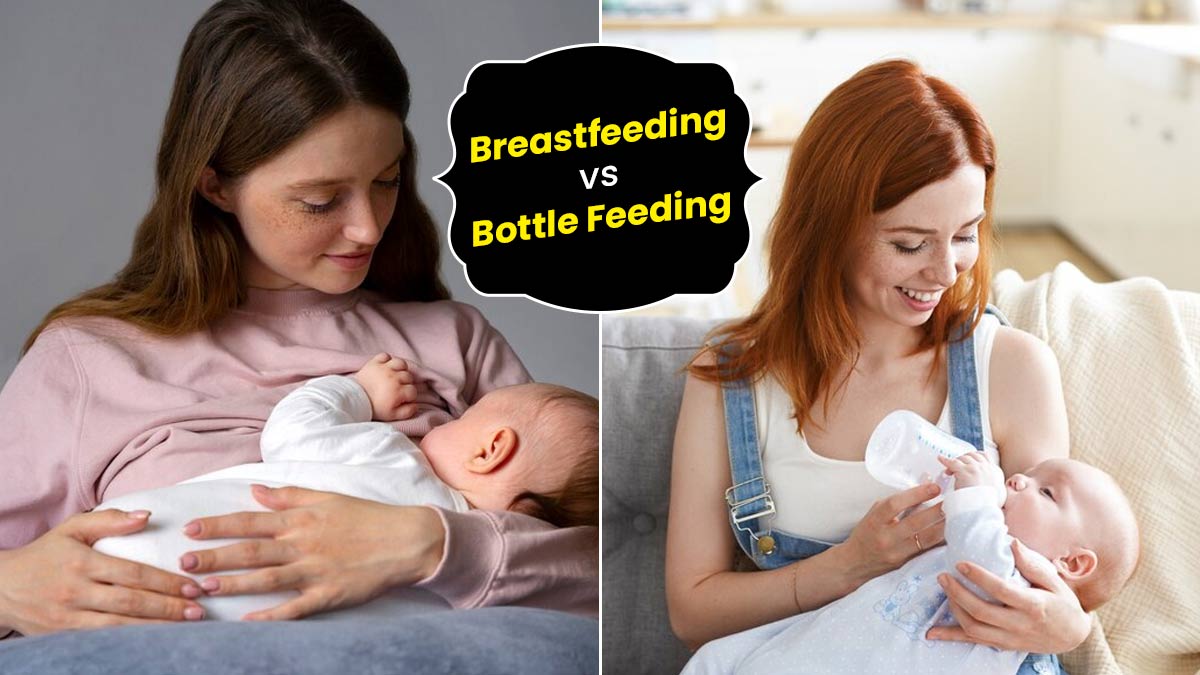
Breast milk serves as nature's ideal nourishment for babies, providing essential nutrients and antibodies that help build a strong immune system. However, many parents often struggle with the decision between breastfeeding and bottle feeding. Some women are unable to breastfeed, while others choose formula feeding based on their comfort and lifestyle. We spoke to Dr Rahul Verma, Director - Neonatology and General Paediatrics, Sir HN Reliance Foundation Hospital, Mumbai, who explained the differences between breastfeeding and bottle feeding and which one is better.
Table of Content:-
Breastfeeding Benefits

“During the baby's first few months, breast milk is especially high in antibodies, which boost the immune system. This is because of the precious colostrum that is often referred to as liquid gold”, said Dr Verma. Consistent breastfeeding ensures a steady supply of these immune-boosting elements for babies, protecting them against many illnesses.
Dr Verma added, “Apart from antibodies, breast milk contains proteins like lactoferrin and lysozyme, healthy fats crucial for brain development, sugars that act as prebiotics, and White Blood Cells (WBCs) that support the baby's immune system. It also helps regulate inflammation, which is important for a balanced immune response.”
Breast milk also contains probiotics that support a healthy gut microbiome in babies. According to the Multidisciplinary Digital Publishing Institute (MDPI), breast milk offers protection against viral, bacterial, and ear infections as well as pneumonia.
“Breastfeeding for longer periods may reduce the chances of childhood leukaemia and lymphoma, showing how beneficial breastfeeding can be for a child's health”, said Dr Verma.
Also Read: Bonding Beyond Words: Expert Explains The Emotional Connection of Breastfeeding
Bottle Feeding Considerations

On the other hand, breast milk is the most natural and nutritious food for a newborn, providing essential nutrients and antibodies that help boost their immune system and overall health.
If you are considering bottle-feeding your baby, it's essential to know the advantages and disadvantages of this method.
“One of the primary benefits is that it provides flexibility for parents, allowing both partners to participate in feeding duties and bond with their children. Bottle feeding also makes it easier to monitor the baby's nutritional intake, which is essential for their growth and development", added Dr Verma.
Moreover, this method offers greater convenience as caregivers, in the absence of the mother, can prepare formula in advance and feed the baby on the go without the need for complex arrangements. With the proper support and guidance, bottle-feeding can be a healthy and positive way to nourish your baby.
Also Read: Nursing Bottle Caries In Children: Expert Lists Its Symptoms, Causes And Treatment
Drawbacks of Bottle Feeding
Although bottle feeding is a viable alternative, it does have significant drawbacks.
Dr Verma highlighted, “One of the major concerns is that formula milk may not contain the same level of essential antibodies and nutrients found in breast milk, which can compromise the baby's immune system and overall health.”
Additionally, formula feeding can be more expensive than breastfeeding, considering the cost of formula, bottles, and other necessary accessories. Furthermore, bottle feeding can have a significant environmental impact due to the amount of disposable bottle-related waste generated.
Moreover, some infants may struggle with nipple confusion, which can make it difficult to switch between breast and bottle and potentially cause breastfeeding problems.
Bottomline
Dr Verma concluded, “While bottle feeding offers convenience and shared caregiving, it may lack the nutritional benefits and environmental sustainability associated with breastfeeding. Deciding between breast and bottle feeding is a personal choice, often influenced by individual circumstances and preferences.”
[Disclaimer: This article contains information provided by a registered healthcare professional and is for informational purposes only. Hence, we advise you to consult your expert for making informed health decisions.]
Also watch this video
How we keep this article up to date:
We work with experts and keep a close eye on the latest in health and wellness. Whenever there is a new research or helpful information, we update our articles with accurate and useful advice.
Current Version